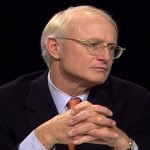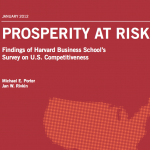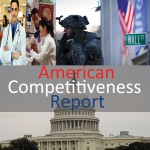While American competitiveness is often framed in terms of productivity and the ability of businesses to succeed against increasingly capable global competitors, Harvard Business School professor  Michael Porter
Michael Porter
Michael Porter says there are also big implications for diplomats and others setting the U.S. agenda abroad.
“This issue of U.S. competitiveness is not just the U.S. No. 1 economic issue, it’s our No. 1 foreign policy issue. It’s going to determine our influence in the world and our ability to shape the
international dialogue,” said Porter during a recent interview with Charlie Rose.
Watch the interview with Charlie Rose.
With that in mind, the urgency of improving American competitiveness only increases. America’s strength depends on much more than military might, particularly at a time of defense spending cuts. See the American Security Project report, “American Competitiveness – An Issue of National Security.”
“The U.S. has been the champion of the free market economy,” he said.
Porter and other Harvard Business School faculty are focused on finding ways to help U.S. businesses compete in the global economy while also improving the standard of living for American workers. Doing one without the other means the American system is falling short, he said.
“To me, this is the big story of the whole age of America,” he said in the interview. “Can we restore the competitiveness of our economy so we can restart the middle class prosperity engine?”
There are major challenges, among them political ones. The most recent HBS report on competitiveness, based on a survey of thousands of HBS alumni and other members of the public, found continued pessimism about the decline of American competitiveness. Yet it also revealed interest in tackling big issues in Washington.
“Overall, corporate tax reform, a sustainable federal budget, infrastructure investments, responsible new- energy extraction, and assertive action on international trade were compelling policy winners,” the report said. “They garnered majority support, left and right, from business leaders and the general public alike.”
Click here to watch the full interview with Charlie Rose.
Key Links:
Harvard Business School – American Competitiveness
Harvard Business Review Special Edition
HBS Survey on U.S. Competitiveness: Prosperity at Risk
Check out ASP’s White Paper on American Competitiveness that discusses these issues further:
Read our Blogs and Listen to our other podcasts in the series:
Podcasts:
Interview – Norm Augustine: Willpower, patience needed to improve American competitiveness
Interview – Debt ceiling again looms large for states, city government
American Competitiveness – Interview with former Gov. Christine Todd Whitman
Adm. William Fallon (Ret.) on sequestration and American Competitiveness
Sequestration – what’s happening in the States
American Competitiveness and National Security – Podcast
Blog Posts:
Look beyond winners and losers in the DoD budget
Event Recap: The UK in the EU and the Future of Transatlantic Cooperation
The STEM Jobs Shortfall Is a National Security Shortcoming We Can Fix
Immigration, American Competitiveness and National Security
Making the case for U.S. leadership in the Pacific
Pentagon – Rare Metals Shortfalls is a National Security Challenge
More Fiscal Focus From The Chairman Of The Joint Chiefs
America’s Long-Term Test: Fusion Power
Moment near for a ‘grand bargain’ on the debt?
Veteran Unemployment and American Competitiveness
Living with uncertainty in the defense industry
Harvard Business School survey finds more pessimism about U.S. competitiveness
Competitiveness – Education: What most schools don’t teach




